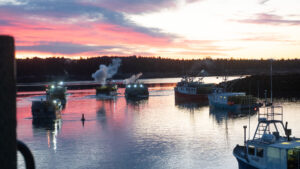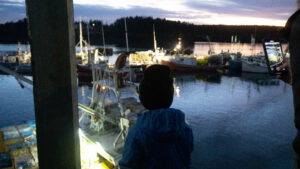
Setting day isn’t just the first day of lobster season in Charlotte County – it is about tradition.
In Back Bay, before the sun begins to rise, families gather to send off the fishermen and women in boats that will race to set traps for the season. Some have waited on this wharf in the cold temperatures, watching their loved ones, for more than 40 years.

“This is incredibly important for fisherman, not just because everyone is leaving in the same to head out to the fishing grounds, but because [it’s] the beginning of the fishing season and November tends to be when there is the best catch,” said Mishona Collier, with the Fundy North Fisherman’s Association.
About 20 boats left Back Bay on Tuesday, with most of them loaded up with traps, and this year the season started early. Dozens more set sail from varying wharves across the Local Fishing Area (LFA) 36.

In LFA 36, which spans from St. Martins to St. Stephen, including Campobello and Deer Islands, setting day is on the second Tuesday in November – weather dependent.
“Of course, weather is an enormous concern for safety with the boats piled high, as well as extra crew on board,” Collier said. “The Department of Fisheries and Oceans, at least for the last few years, has allowed us to have a weather window of about 48 hours. If [the] setting day on Tuesday has weather that is too extreme for the fishermen to go out, and it has to meet certain criteria, then they’re able to vote on a day that is fit for setting.”
If wind speeds are more than 20 knots and waves are in excess of 1.5 metres high, the crews can start the season early.
However, with calm seas and clear skies and blistering weather predicted for the second Tuesday in November, boats head off early to place different methods of setting traps. Traps can be set individually or through a trawl – which involves laying multiple traps along a groundline.

She said each fishermen and the crew are small, independent businesses.
“I know for some of our fishermen, they make most of their money for the entire year in a couple of weeks in November,” she said. “So if something goes wrong, the weather isn’t cooperating, if there’s any issues, it can truly impact their year’s worth of income,” Collier said.
In the end though, Collier explains it’s the traditions that mean the most. Every setting day involves a blessing broadcast over the radio – something to lend comfort to those families who are staying behind.
According to the Transportation and Safety Board of Canada (TSB), incidents on varying vessels are down in 2024. Fishing vessels, it said, accounted for 29 per cent of all shipping accidents, which is the highest proportion among vessel types.

There were 12 fatalities in 2024, which was a decrease from the year prior. TSB said half those were on commercial fishing vessels.
“Even for those folks who aren’t as religious, it brings a lot of comfort,” she said. “These traditional aspects of coming together as a community, circling around fishermen, celebrating them and supporting them – in churches as well as over radio – are incredibly special.”
The season closes on Jan. 14, with the spring and summer season beginning on March 31.



